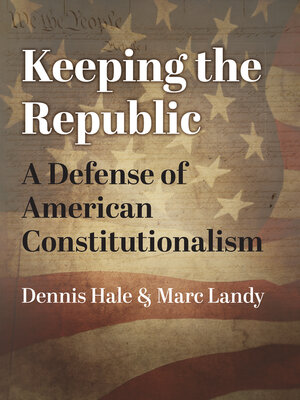Keeping the Republic
ebook ∣ A Defense of American Constitutionalism · American Political Thought
By Hale Dennis

Sign up to save your library
With an OverDrive account, you can save your favorite libraries for at-a-glance information about availability. Find out more about OverDrive accounts.
Find this title in Libby, the library reading app by OverDrive.



Search for a digital library with this title
Title found at these libraries:
| Library Name | Distance |
|---|---|
| Loading... |
Keeping the Republic is an eloquent defense of the American constitutional order and a response to its critics, including those who are estranged from the very idea of a fixed constitution in which "the living are governed by the dead." Dennis Hale and Marc Landy take seriously the criticisms of the United States Constitution. Before mounting their argument, they present an intellectual history of the key critics, including Thomas Paine, William Lloyd Garrison, Henry David Thoreau, Woodrow Wilson, Robert Dahl, Sanford Levinson, and the authors of The 1619 Project. Why, they ask, if the constitutional order is so well-designed, do so many American citizens have a negative view of the American political order? To address that question, they examine the most crucial episodes in American political development from the Founding to the present.
Hale and Landy frame their defense of the Constitution by understanding America in terms of modernity, where small republics are no longer possible and there is a need to protect the citizens of a massive modern state while still preserving liberty. The Constitution makes large, popular government possible by placing effective limits on the exercise of power. The Constitution forces the people to be governed by the dead, both to pay the debt we owe to those who came before us and to preserve society for generations yet unborn.
The central argument of Keeping the Republic is that the Constitution provides for a free government because it places effective limits on the exercise of power—an essential ingredient of any good government, even one that aims to be a popular government. That the people should rule is a given among republicans; that the people can do anything they want is a proposition that no one could accept with their eyes wide open. Thus, the limits that the Constitution place on American political life are not a problem, but a solution to a problem.
Hale and Landy offer both a survey of American anti-constitutionalism and a powerful argument for maintaining the constitutional order of the nation's Framers.







